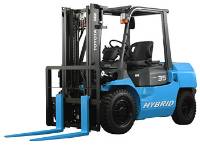Toyota Industries Corporation Group's commitment to the environment is evident in the eco-friendly management systems that are used in our production facilities (ex. ISO 14001 obtained by Takahama Plant). This commitment extends to our products:
- Toyota's electric powered counterbalance forklifts combine the safety, durability, and reliability of internal combustion trucks with the zero operating emissions, ergonomics, and speed of electric forklifts.
- 3-way Catalytic Converter System and Catalytic Muffler can be equipped to reduce harmful emissions from petrol/LPG and diesel engines, respectively.
- Plus, every Toyota forklift is manufactured is up to 99% recyclable.
Learn more about Toyota Industries Corporation Group Environmental Initiatives and Takahama Plant initiatives to toward zero CO2 emissions at the production line here
Learn more about Toyota Industries Corporation's Global Sustainability and Environmental Initiatives here
Learn more about Toyota Material Handling International Sustainability initiatives here
Learn more about the energy storage system used at Toyota Industries Corporation's Takahama Plant’s - FC Modules Paving the Way for the Future! Tackling Renewable Energy and Carbon Neutrality.
Toyota Industries Corporation Annual Report explains the overview of the Toyota Group’s sustainability and promotion of ESG Initiatives - https://www.toyota-industries.com/investors/item/TICO%20Report2024_E_P37-83_Promotion%20of%20ESG%20Initiatives.pdf






